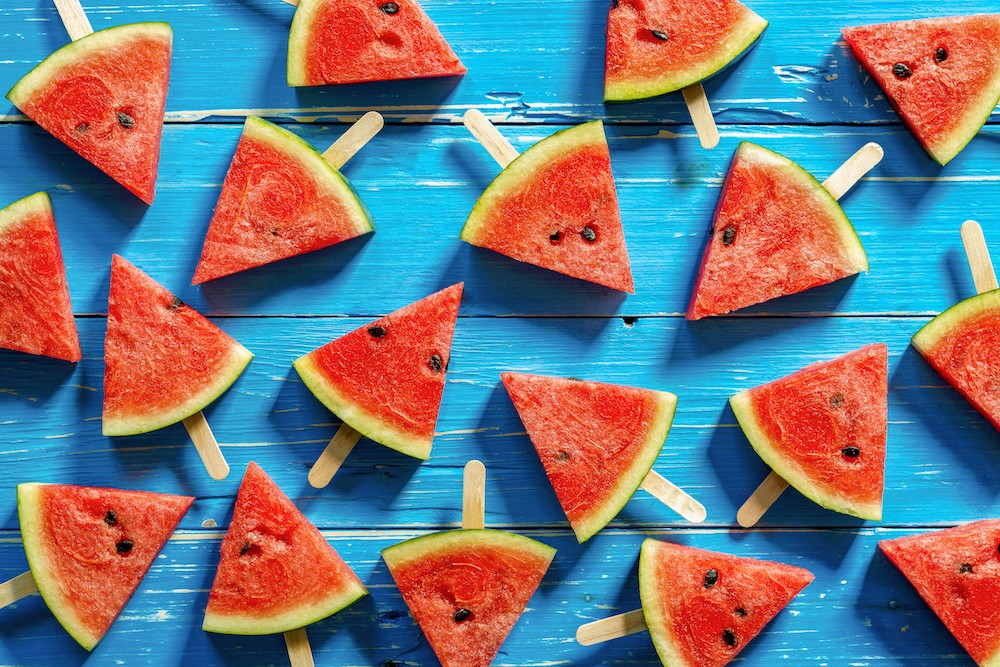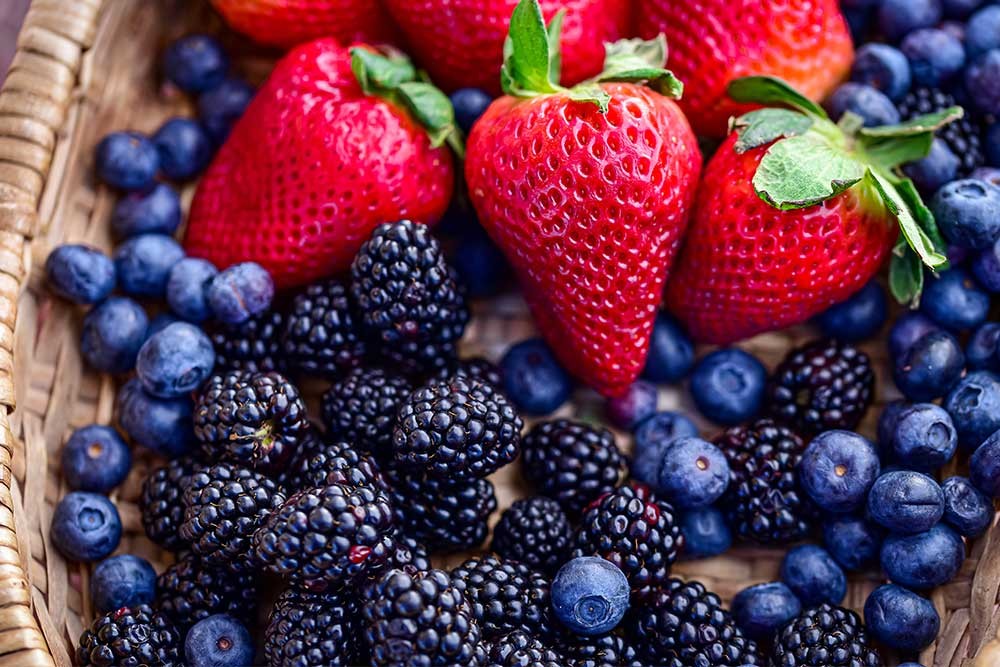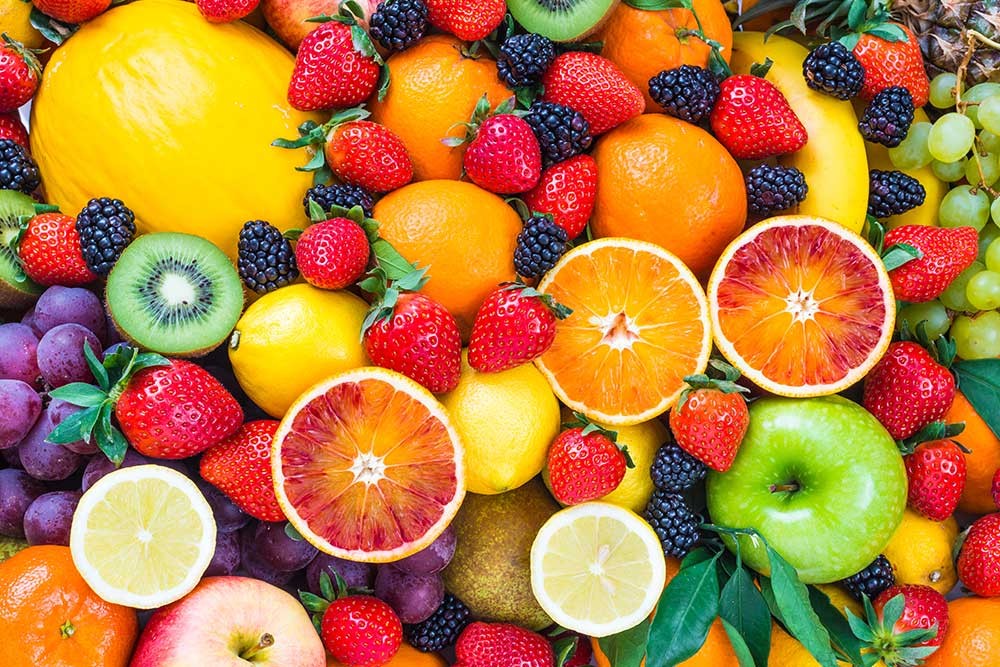Is Watermelon A Good Diet Food? Discover how this refreshing fruit, celebrated for its hydrating properties and sweet taste, can become an effective component of your diet plan. FOODS.EDU.VN unveils the secrets of watermelon, supported by scientific insights, to transform your understanding of healthy eating and weight management. Dive in to learn how you can enjoy this delicious fruit while achieving your dietary goals, exploring its advantages over high-calorie alternatives.
1. Understanding Watermelon’s Nutritional Profile
Watermelon, scientifically known as Citrullus lanatus, is more than just a summertime treat; it’s a nutritional powerhouse. Its composition makes it an ideal candidate for those looking to manage their weight or simply maintain a healthy diet.
1.1. Calorie Content
One of the most appealing aspects of watermelon is its low-calorie density. A 1-cup serving (approximately 152 grams) contains only about 46 calories, making it a guilt-free option for snacking or as part of a meal. This low-calorie count allows you to consume a significant volume of food without a high caloric intake, crucial for feeling full and satisfied.
1.2. Hydration Properties
As the name suggests, watermelon is predominantly water—about 92%. This high water content contributes significantly to hydration, which is essential for overall health, including metabolism and appetite regulation. Dehydration can often mimic hunger, so staying hydrated with watermelon can help prevent unnecessary snacking.
1.3. Vitamins and Minerals
Beyond water and low calories, watermelon is a source of essential vitamins and minerals. It’s particularly rich in:
- Vitamin C: An antioxidant that supports immune function and skin health.
- Vitamin A: Important for vision, immune function, and cell growth.
- Potassium: An electrolyte that helps regulate blood pressure and muscle function.
- Magnesium: Involved in over 300 enzymatic reactions in the body, including energy production and muscle and nerve function.
1.4. Lycopene and Antioxidants
Watermelon is an excellent source of lycopene, a powerful antioxidant linked to several health benefits, including:
- Heart Health: Lycopene may help reduce the risk of heart disease by lowering blood pressure and improving cholesterol levels.
- Cancer Prevention: Some studies suggest that lycopene may have protective effects against certain types of cancer, such as prostate cancer.
- UV Protection: Lycopene can help protect the skin from sun damage.
2. Watermelon as a Weight Loss Ally
Given its nutritional profile, watermelon can be a valuable tool in a weight loss or weight management strategy. Here’s how:
2.1. Promoting Satiety
The high water and fiber content in watermelon contribute to satiety, the feeling of fullness that helps prevent overeating. When you consume watermelon, the volume of water and fiber stretches the stomach, sending signals to the brain that you are full. This can lead to reduced calorie intake throughout the day.
2.2. Reducing Calorie Intake
By replacing higher-calorie snacks or desserts with watermelon, you can significantly reduce your overall calorie intake. For example, swapping a 200-calorie cookie with a serving of watermelon can save you 154 calories while providing more nutrients and hydration.
2.3. Supporting Hydration
Proper hydration is crucial for weight loss. Water helps boost metabolism, facilitate digestion, and eliminate waste products. Watermelon’s high water content ensures that you stay hydrated, supporting these processes and potentially aiding in weight loss.
2.4. Curbing Cravings
The natural sweetness of watermelon can help satisfy sweet cravings without the need for processed sugars or high-calorie treats. This can be particularly helpful for those who struggle with sugar cravings during a diet.
3. Incorporating Watermelon into Your Diet
Integrating watermelon into your diet is easy and versatile. Here are some creative ways to enjoy this fruit:
3.1. Snacking
Watermelon makes an excellent standalone snack. Cut it into cubes or use a melon baller for easy snacking. Keep a container of watermelon in the refrigerator for a refreshing and healthy option whenever hunger strikes.
3.2. Salads
Add watermelon to salads for a burst of sweetness and hydration. It pairs well with:
- Feta cheese
- Mint
- Cucumber
- Red onion
- Balsamic vinaigrette
3.3. Smoothies
Blend watermelon into smoothies for a refreshing and hydrating drink. Combine it with:
- Berries
- Spinach
- Banana
- Lime juice
3.4. Juices
Watermelon juice is a delicious and hydrating beverage. Simply blend watermelon and strain the juice. You can add a squeeze of lime or mint for extra flavor.
3.5. Frozen Treats
Make watermelon popsicles or sorbet for a healthy and refreshing dessert. Blend watermelon and freeze it in popsicle molds or churn it in an ice cream maker for a sorbet.
3.6. Grilling
Grilling watermelon brings out its natural sweetness and adds a smoky flavor. Cut watermelon into slices and grill them for a few minutes on each side. Serve as a side dish or as part of a grilled salad.
4. Scientific Evidence Supporting Watermelon’s Benefits
Several studies have highlighted the benefits of watermelon consumption, particularly concerning weight management and overall health.
4.1. Arginine and Fat Burning
Watermelon is a source of the amino acid arginine, which has been studied for its potential to promote fat burning. A study published in the Journal of Nutrition found that arginine supplementation can increase fat oxidation and improve metabolic profiles in obese individuals. While watermelon contains arginine, it is essential to note that the amount may not be as concentrated as in supplement form.
4.2. Lycopene and Cardiovascular Health
Lycopene, abundant in watermelon, has been linked to improved cardiovascular health. A meta-analysis published in the American Journal of Clinical Nutrition concluded that higher lycopene intake is associated with a reduced risk of cardiovascular disease.
4.3. Hydration and Metabolic Rate
Staying hydrated is crucial for maintaining a healthy metabolism. Research published in the Journal of Clinical Endocrinology and Metabolism showed that drinking water can increase metabolic rate, which can aid in weight loss. Watermelon’s high water content makes it an excellent choice for staying hydrated and supporting metabolic function.
4.4. Satiety and Weight Management
Foods with high water and fiber content, like watermelon, can promote satiety and reduce calorie intake. A study published in the Journal of the American Dietetic Association found that incorporating high-volume, low-calorie foods into the diet can lead to greater weight loss.
5. Addressing Common Concerns About Watermelon
While watermelon offers numerous benefits, some common concerns need addressing.
5.1. Sugar Content
Watermelon does contain natural sugars, which can be a concern for some people, particularly those with diabetes. However, the glycemic index (GI) of watermelon is around 76, which is considered moderately high. The glycemic load (GL), which considers the portion size, is relatively low at about 5 per serving. This means that while watermelon can raise blood sugar levels, it does so moderately when consumed in reasonable amounts.
For individuals with diabetes, it’s essential to monitor blood sugar levels and consume watermelon in moderation as part of a balanced diet. Pairing watermelon with protein or healthy fats can also help mitigate its impact on blood sugar.
5.2. FODMAPs
Watermelon contains FODMAPs (fermentable oligosaccharides, disaccharides, monosaccharides, and polyols), which are carbohydrates that can cause digestive issues in some people, particularly those with irritable bowel syndrome (IBS). If you have IBS or are sensitive to FODMAPs, you may need to limit your watermelon intake.
5.3. Allergies
While rare, watermelon allergies can occur. Symptoms can range from mild itching and hives to more severe reactions like anaphylaxis. If you suspect you may be allergic to watermelon, consult with an allergist for testing and guidance.
6. Comparing Watermelon to Other Diet Foods
To better understand watermelon’s place in a healthy diet, let’s compare it to other commonly recommended diet foods.
| Food | Calories per 100g | Water Content | Fiber Content | Key Nutrients | Benefits |
|---|---|---|---|---|---|
| Watermelon | 30 | 92% | 0.4g | Vitamins A and C, Lycopene | Hydrating, low-calorie, antioxidant-rich |
| Apple | 52 | 84% | 2.4g | Vitamin C, Potassium | High in fiber, promotes satiety |
| Cucumber | 15 | 96% | 0.7g | Vitamin K, Potassium | Very low-calorie, hydrating |
| Grapefruit | 42 | 91% | 1.6g | Vitamin C, Lycopene | May help with weight loss, rich in antioxidants |
| Berries | 50-85 | 85-90% | 2-5g | Vitamins C and K, Antioxidants | Low in sugar, high in fiber and antioxidants |
| Leafy Greens | 10-25 | 90-95% | 1-3g | Vitamins A, C, K, Folate | Very low-calorie, nutrient-dense |



As the table illustrates, watermelon stands out for its high water content and low-calorie density, making it an excellent choice for hydration and weight management. While other fruits and vegetables offer unique nutritional benefits, watermelon provides a refreshing and satisfying option that can easily fit into a balanced diet.
7. Expert Opinions on Watermelon and Diet
Nutrition experts and dietitians often recommend watermelon as part of a healthy eating plan. According to Rachel Lander-Canseco, RD, a registered dietitian at Keck Medicine of USC, “Because 90% of a watermelon’s weight is water, it’s one of the best fruits to eat if you’re trying to lose weight… In addition to helping the body stay hydrated, snacking on watermelon will help you feel full, so you won’t have cravings between meals.”
Other nutritionists echo this sentiment, emphasizing the importance of incorporating a variety of fruits and vegetables into the diet for overall health and weight management. Watermelon’s unique combination of hydration, low calories, and essential nutrients makes it a valuable addition to any healthy eating plan.
8. Practical Tips for Buying and Storing Watermelon
To maximize the benefits of watermelon, it’s essential to choose a ripe and fresh fruit. Here are some tips for buying and storing watermelon:
8.1. Choosing a Ripe Watermelon
- Look for a Field Spot: The field spot is the area where the watermelon rested on the ground. A ripe watermelon will have a creamy yellow or orange field spot.
- Thump Test: Tap the watermelon. A ripe watermelon will have a deep, hollow sound.
- Weight: A ripe watermelon should feel heavy for its size, indicating high water content.
- Shape: Choose a watermelon that is symmetrical and free from bruises or cuts.
8.2. Storing Watermelon
- Whole Watermelon: Store a whole watermelon at room temperature for up to two weeks. Once cut, store it in the refrigerator.
- Cut Watermelon: Store cut watermelon in an airtight container in the refrigerator for up to five days.
- Freezing Watermelon: While freezing watermelon can change its texture, it’s still a good option for smoothies or frozen treats. Cut the watermelon into cubes and freeze them in a single layer on a baking sheet before transferring them to a freezer bag.
9. Recipes Featuring Watermelon
Here are some delicious and healthy recipes featuring watermelon:
9.1. Watermelon and Feta Salad
Ingredients:
- 4 cups cubed watermelon
- 1 cup crumbled feta cheese
- 1/2 cup thinly sliced red onion
- 1/4 cup fresh mint leaves, chopped
- 2 tablespoons olive oil
- 1 tablespoon balsamic vinegar
- Salt and pepper to taste
Instructions:
- In a large bowl, combine watermelon, feta cheese, red onion, and mint leaves.
- In a small bowl, whisk together olive oil and balsamic vinegar.
- Pour the dressing over the salad and toss gently to combine.
- Season with salt and pepper to taste.
- Serve immediately.
9.2. Watermelon Smoothie
Ingredients:
- 2 cups cubed watermelon
- 1/2 cup mixed berries (strawberries, blueberries, raspberries)
- 1/2 banana
- 1 cup spinach
- 1/2 cup water or coconut water
- 1 tablespoon lime juice
Instructions:
- Combine all ingredients in a blender.
- Blend until smooth.
- Add more water or coconut water if needed to reach desired consistency.
- Pour into a glass and serve immediately.
9.3. Grilled Watermelon
Ingredients:
- 1-inch thick watermelon slices
- Olive oil
- Balsamic glaze
- Fresh basil leaves
Instructions:
- Preheat grill to medium-high heat.
- Brush watermelon slices with olive oil.
- Grill for 2-3 minutes per side, or until grill marks appear.
- Drizzle with balsamic glaze and garnish with fresh basil leaves.
- Serve warm.
10. Potential Drawbacks and Precautions
While watermelon is generally safe and healthy, there are a few potential drawbacks and precautions to consider:
10.1. Moderation is Key
While watermelon is low in calories, consuming excessive amounts can still lead to calorie surplus and potential weight gain. Enjoy watermelon in moderation as part of a balanced diet.
10.2. Digestive Issues
As mentioned earlier, watermelon contains FODMAPs, which can cause digestive issues in some people. If you experience bloating, gas, or other digestive symptoms after eating watermelon, consider reducing your intake or consulting with a healthcare professional.
10.3. Blood Sugar Levels
Individuals with diabetes should monitor their blood sugar levels when consuming watermelon due to its natural sugar content. Pairing watermelon with protein or healthy fats can help mitigate its impact on blood sugar.
10.4. Allergies
If you suspect you may be allergic to watermelon, consult with an allergist for testing and guidance.
11. Latest Trends in Watermelon Consumption
The popularity of watermelon continues to grow, with new and innovative ways to enjoy this fruit emerging regularly. Some of the latest trends in watermelon consumption include:
- Watermelon Water: Watermelon water, made from the juice of watermelon, is gaining popularity as a hydrating and low-calorie beverage.
- Watermelon Seeds: Watermelon seeds are becoming a popular snack. They are rich in protein, healthy fats, and minerals.
- Watermelon Rind Recipes: Creative chefs are finding ways to use watermelon rind in recipes, such as pickles and stir-fries, to reduce food waste and add unique flavors to dishes.
- Watermelon-Infused Cocktails: Watermelon is a popular ingredient in cocktails, adding a refreshing and fruity twist to classic drinks.
12. Frequently Asked Questions (FAQs) About Watermelon
1. Is watermelon good for weight loss?
Yes, watermelon can be a good addition to a weight loss diet due to its low calorie and high water content, which promotes satiety.
2. How many calories are in a cup of watermelon?
A 1-cup serving (approximately 152 grams) of watermelon contains about 46 calories.
3. Is watermelon high in sugar?
Watermelon contains natural sugars, but its glycemic load is relatively low, meaning it has a moderate impact on blood sugar levels when consumed in reasonable amounts.
4. Can I eat watermelon if I have diabetes?
Yes, but consume watermelon in moderation and monitor your blood sugar levels. Pairing it with protein or healthy fats can help mitigate its impact on blood sugar.
5. Does watermelon help with hydration?
Yes, watermelon is about 92% water, making it an excellent choice for staying hydrated.
6. What are the nutritional benefits of watermelon?
Watermelon is rich in vitamins A and C, potassium, magnesium, and lycopene, a powerful antioxidant.
7. Can watermelon cause digestive issues?
Watermelon contains FODMAPs, which can cause digestive issues in some people, particularly those with IBS.
8. How should I store watermelon?
Store a whole watermelon at room temperature for up to two weeks. Store cut watermelon in an airtight container in the refrigerator for up to five days.
9. What are some creative ways to eat watermelon?
Watermelon can be enjoyed as a snack, in salads, smoothies, juices, frozen treats, or even grilled.
10. Are watermelon seeds edible?
Yes, watermelon seeds are edible and nutritious. They are a good source of protein, healthy fats, and minerals.
13. Conclusion: Embrace Watermelon for a Healthier Lifestyle
In conclusion, watermelon is indeed a good diet food. Its low-calorie density, high water content, and essential nutrients make it a valuable addition to a healthy eating plan, especially for those looking to manage their weight. By incorporating watermelon into your diet in creative and mindful ways, you can enjoy its refreshing taste and reap its numerous health benefits.
Remember to choose ripe watermelons, store them properly, and be mindful of portion sizes to maximize their positive impact on your health. Embrace watermelon as part of a balanced and varied diet, and savor the sweet taste of a healthier lifestyle.
Ready to explore more about healthy eating and discover a wealth of delicious recipes? Visit FOODS.EDU.VN to unlock a treasure trove of culinary knowledge, expert advice, and practical tips to help you achieve your wellness goals. For inquiries, feel free to reach out to us at 1946 Campus Dr, Hyde Park, NY 12538, United States, or contact us via WhatsApp at +1 845-452-9600. Let foods.edu.vn be your guide to a flavorful and nutritious journey.
